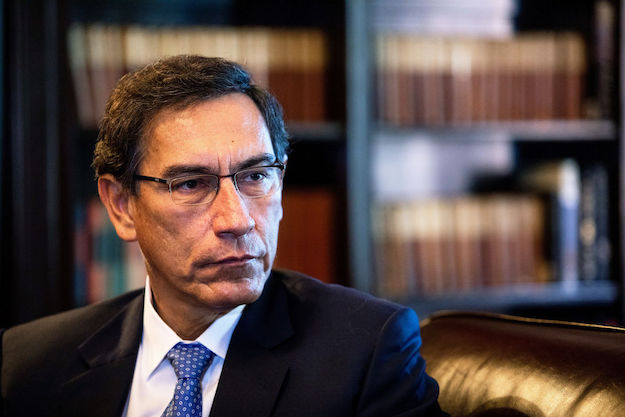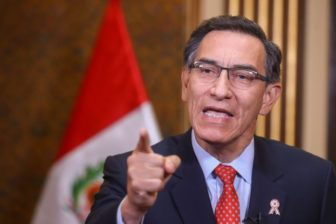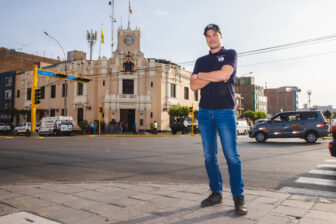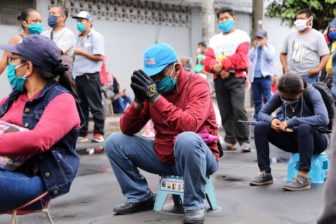Peru’s President Martín Vizcarra is unlikely to be impeached when his case goes to Congress on Sep. 18. But the fact that he’s on trial at all suggests the precariousness of Peru’s political system, where ongoing conflict between the presidency and Congress is distracting from efforts to combat one of the world’s deadliest COVID-19 outbreaks and deepest economic recessions.
On Sep. 11, Peru’s Congress voted to move ahead with impeachment on claims Vizcarra is “morally unfit” to hold office. The charges focus on allegedly illegal contracts signed by the Ministry of Culture with Richard Cisneros, an entertainer who goes by the name of Richard Swing, for $50,000.
Audiotapes surfaced in which Vizcarra and members of his inner circle discuss how to handle the scandal. Manuel Merino, president of the Congress and a member of the center-right Popular Action party, seized on the audiotapes as evidence that Vizcarra was obstructing a congressional investigation, launching a campaign to have him removed from office. Merino moved so quickly that critics dubbed it “impeachment express.”
Numerous observers remarked incredulously that a significant portion of Congress would be willing to impeach the president on minor, unproven corruption allegations, even as the country grapples with the highest COVID-19 death rate per capita in the world, over 30,000 Peruvians dead, and an economy projected to shrink a devastating 12% in 2020.
But the dismal state of Peruvian politics helps explain why. The four right-wing political groups who voted for the impeachment trial – Merino’s Popular Action (AP), the Alliance for Progress (APP), Podemos Perú, and Union for Peru (UPP) – have something in common: They are terrified of Vizcarra’s anti-corruption campaign, a package of proposed reforms that includes plans to clean up campaign financing, make internal party elections more transparent, and toughen rules preventing convicted criminals from running for public office.
The four parties also seem to think that contriving a way – through impeachment or other means – to postpone general elections currently scheduled for April 2021 would benefit them.
Their current effort appears to have fizzled. On Sep. 12, the day after Congress voted to move ahead with the trial, a report published by veteran investigative journalist Gustavo Gorriti revealed that Merino had tried to enlist the support of the Peruvian military in his campaign to remove Vizcarra. Because Peru currently has no vice presidents, Merino would be next in line as president. Subsequent reporting revealed that Merino, readying himself for his presumptive new role, had begun to assemble a cabinet.
Backing for impeachment has deflated in the wake of these revelations. The 65 votes that moved the trial forward in the first place were already well short of the 87 needed to actually impeach the president. Since then, César Acuña from the APP has withdrawn his support for the measure.
Vizcarra has also filed an injunction with the Constitutional Tribunal to halt the proceedings. Meanwhile, Merino’s outreach to the military has drawn sharp criticism, with some accusing him of engaging in an “act of sedition,” though a censure effort against him in Congress failed to gain traction.
But whatever the result of the vote on Sep. 18, the broader difficulties facing the president remain. Vizcarra came to office after his predecessor resigned to avoid being impeached himself. He lacks a political party and has no representatives in Congress, which itself is fragmented into nine different electoral blocks. The stalemate between the executive and the legislative branch, which contributed to Vizcarra’s decision last year to dismiss Congress and hold new congressional elections, continues to undermine governance. Vizcarra’s anti-corruption reforms have overwhelming public support, but his lack of a party and a caucus in Congress, alongside continued congressional resistance, make it very difficult for him to get his initiatives approved.
If there is a positive takeaway from the impeachment imbroglio it is that the Peruvian armed forces rebuked the effort of congressional leaders to get involved in a political dispute. The past 20 years – since the end of the Fujimori decade that was marked by authoritarian governance and extreme politicization of the armed forces – have been the longest stretch of uninterrupted democratic governance in Peru’s history. Its democracy has been marred by official corruption and political instability, but it is no small feat that the country has managed to keep the military more or less on the margins of political life (even as one of its recent presidents, and many of its ministers and members of Congress, have been retired military officials).
That said, Vizcarra has relied on support from the military to lend legitimacy to his government in his ongoing disputes with the legislature. In the context of the current pandemic, he has also leaned heavily on the military to uphold his closed borders policy and to institute quarantines and curfews, and has called up reservists.
What is clear is that this impeachment effort will not be the last of Peru’s political turmoil. While the politicians argue, the COVID-19 pandemic rages on. The economic crisis means more and more people are going to bed hungry each night. The public health system, weak to begin with, is collapsing. Corruption remains endemic and undermines both economic recovery and effective public health policies to deal with the pandemic. A weak president under permanent attack by a fragmented Congress is a huge challenge for democratic governance under normal circumstances. In pandemic times, it is a volatile mix, with potentially tragic consequences.
—
Burt is an associate professor at the Schar School of Policy and Government at George Mason University and a senior fellow at the Washington Office on Latin America (WOLA). She is the author of Political Violence and the Authoritarian State in Peru: Silencing Civil Society (Palgrave, 2007).








